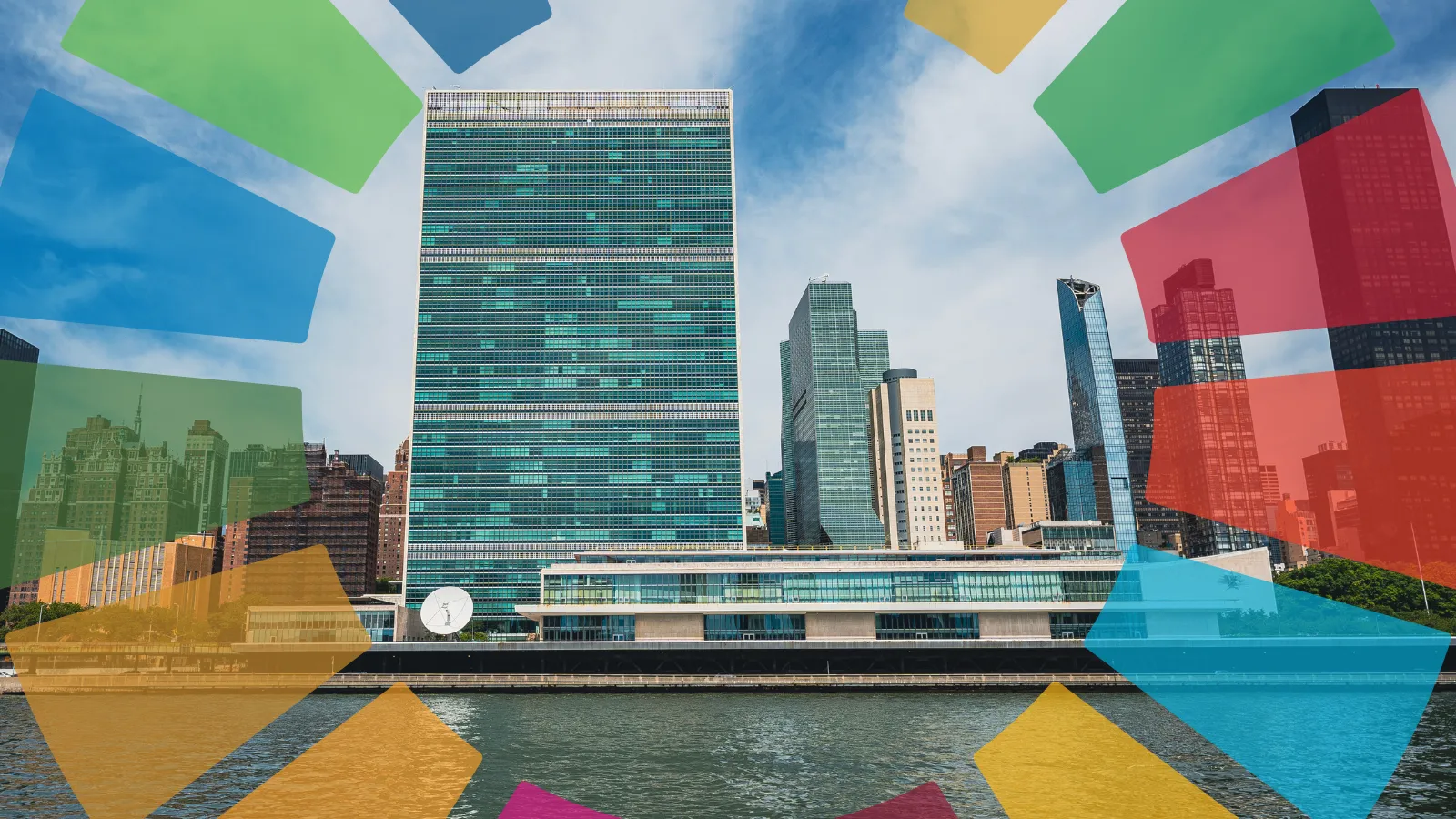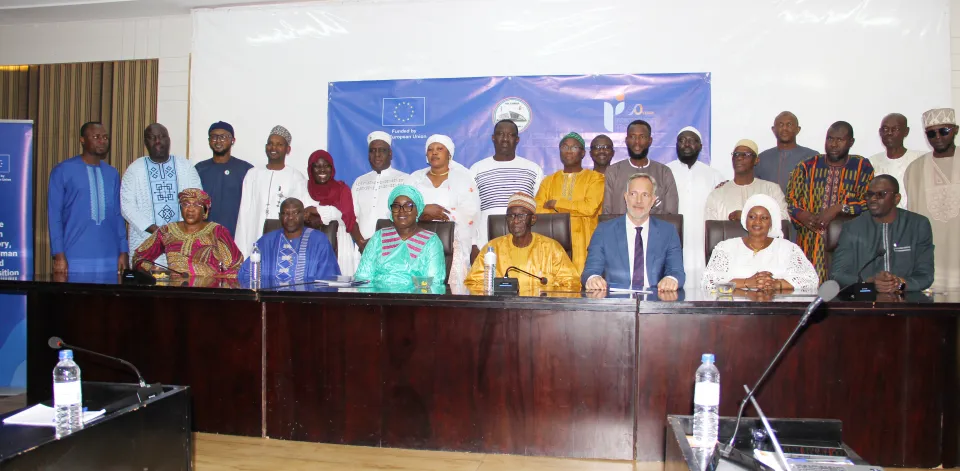Democracy on Display: How Voluntary National Reviews Spotlight Governance Progress

The United Nations (UN) and its 193 Member States marked a significant milestone in September 2015 with the adoption of the 2030 Agenda for Sustainable Development, consisting of 17 Sustainable Development Goals (SDG) focusing on people, prosperity, peace and institutions, planet, and partnerships. Every year in July, a set of SDGs is reviewed in depth during the High-Level Political Forum (HLPF), with SDGs 1 (No Poverty), 2 (Zero Hunger), 13 (Climate Action), 16 (Peace, Justice, and Strong Institutions), and 17 (Partnerships) under review in 2024.
The HLPF also provides an opportunity for countries to present their own Voluntary National Reviews (VNRs), assessing progress, gaps, achievements, and challenges in the implementation of the SDGs at their national level. To date since 2016, 367 VNRs from 191 Member States and Observers have been officially presented at the HLPF, of which 36 were submitted in 2024, including first-timers South Sudan and Yemen. Through its Permanent Observer status at the UN General Assembly, International IDEA brings the lens of democracy into UN processes and resolutions, and advocates for the importance of SDG 16 as an enabler and accelerator of the 2030 Agenda, given the alignment between SDG 16 and key democratic principles.
Against this backdrop, this article provides a brief overview of how SDG 16 dimensions related to democracy were referenced in the 2024 VNRs. A total of 13 keywords (Table 1) have been used consistent with the targets of SDG 16 and aligned according to the democratic dimensions of participation, representation, rights, and the rule of law as measured by International IDEA’s Global State of Democracy Indices. This article does not reference how each country addresses these themes in their reports, nor how exhaustive their analyses are. A detailed report on these elements will be launched by International IDEA in the fall of 2024.
Table 1. Keywords in relation to International IDEA’s GSoD Indices attributes and the targets of SDG 16
|
Target |
Target description |
GSoD-related democracy attribute |
GSoD-related democracy keyword |
|
16.3 |
Promote the rule of law at the national and international levels and ensure equal access to justice for all |
Rule of Law |
Rule of Law Access to Justice
|
|
16.5 |
Substantially reduce corruption and bribery in all their forms |
Rule of Law |
Corruption |
|
16.6 |
Develop effective, accountable and transparent institutions at all levels |
Democracy |
Elections Governance |
|
16.7 |
Ensure responsive, inclusive, participatory and representative decision-making at all levels |
Participation Representation |
Political Representation Political Parties Civil Society Political Participation |
|
16.10 |
Ensure public access to information and protect fundamental freedoms, in accordance with national legislation and international agreements |
Rights |
Fundamental Freedoms Press Freedom Human Rights
|
In total, 34 out of 36 2024 VNRs were included in this analysis – Samoa and South Sudan were not incorporated due to their unavailable reports at the time of writing. The keywords include access to justice, civil society, corruption, democracy, elections, fundamental freedoms, governance, human rights, political participation, political parties, political representation, press freedom, and rule of law (Figure 1).
Civil society, corruption, rule of law, and human rights were the issues most highlighted in the VNRs, with press freedom, political representation, political parties, and fundamental freedoms receiving less coverage. Of the countries that presented their review in 2024, Brazil, Nepal, Spain, and Sierra Leone covered most democracy-related issues while the Republic of the Congo, Syria, and Yemen had the lowest coverage (Figure 2).
Figure 1. Number and percentage of countries addressing key SDG 16 dimensions and democratic principles in their 2024 Voluntary National Review
Figure 2. Number of democracy-related issues addressed by each country that presented their VNR in 2024
Explanation: At least one mention of the keywords must be included in the VNR reports to be considered an issue covered by the country. This graph does not reference how many times or how each issue was addressed in the country reports. For example, the Republic of the Congo made references to Civil Society, Corruption, and Governance in their 2024 VNR; therefore, they scored a total of 3 issues addressed.
OVERVIEW OF DEMOCRACY DIMENSIONS ADDRESSED IN THE 2024 VNRs
Democracy. Strengthening and defending democracy, the weakening of institutions as threats to democracy, and democracy as an essential element for building peaceful and just societies were topics highlighted in 44% of the VNRs. Moreover, democracy was also addressed as an important attribute for greater representation and participation of women and girls in politics.
Civil society. The inclusive participation of civil society, including women and youth groups, and their meaningful engagement within the implementation of the 2030 Agenda was a key highlight in the VNRs, which addressed their fundamental role in sustainable development and in achieving the SDGs in partnership with governments and other stakeholders. Issues related to civil society were addressed by 94% of the VNRs in 2024.
Corruption. Low levels of corruption, fraud, bribery, and illicit financial flows were attributed to effective anti-corruption measures, as well as increased levels of public trust in institutions and social cohesion. Despite this, many countries still face challenges in fighting corruption and increasing accountability of the public sector. This keyword was highlighted by 85% of the VNRs in 2024.
Rule of law. This key SDG 16 attribute was closely linked to the positive outcome of human rights, democracy, good governance, fundamental freedoms, transparent and accountable institutions, anti-corruption measures, equal access to justice for all, and the independence of the judiciary system. Many issues essential for democracy cannot be achieved without the rule of law. 82% of the VNRs contained issues related to the rule of law in their VNRs.
Human rights. The protection and strengthening of human rights, particularly in areas related to the environment, conflicts, gender, vulnerable groups and communities, social inclusion, education, international law, and the attainment of the 2030 Agenda were some of the issues addressed by 79% of the VNRs.
Governance. Economy and governance, accountable public governance, democratic governance and social cohesion, inclusive governance, digitalization and governance, and governance reform were topics reviewed by 73% of the VNRs in 2024.
Access to justice. Increased access to justice for victims of gender-based violence and minority and vulnerable groups were issues addressed in the VNRs, with 73% of the countries addressing the theme of access to justice overall. Additionally, ensuring access to justice was highlighted as a key element of building effective and accountable institutions at all levels.
Elections. Democratic processes and free and fair elections were conducted in several countries that presented their VNRs in 2024 within the last few years. 47% of the countries highlighted the topic of elections, including their municipal, general, and presidential electoral processes, the positive outcome on women’s political participation and representation within their governments, and the negative issues surrounding mistrust in electoral processes.
Political participation. More political participation of women, youth, and people with disabilities is needed in electoral and decision-making processes to strengthen the empowerment of these groups. Broader political participation is still a challenge in some political contexts, although several countries reported increased participation of women in electoral processes. These issues were highlighted across 41% of the VNRs presented.
Fundamental freedoms. Target 16.10 on ensuring public access to information and protecting fundamental freedoms, in accordance with national legislation and international agreements was highlighted by 29% of the countries, in which some have either partly achieved its indicators or shown moderate progress overall.
Political parties. Fostering dialogue among different political parties and supporting the inclusion of all groups of society in political processes, including the inclusion of women in leadership positions within political parties were briefly addressed by 26% of the countries that reported on this attribute.
Political representation. Only 6% of the VNRs highlighted this attribute in 2024. The issue of increased political representation was addressed through gender mainstreaming policies following targets and indicators of SDG 5.
Press freedom. Only 2 (6%) countries reported on this attribute, showing increased levels of press freedom in their countries based on the World Press Freedom Index of 2022 and 2023, with one country stating that universal access to information is an essential tool for good governance and a critical enabler of the SDGs.
The 2024 HLPF provided a unique opportunity for countries to highlight progress, challenges, and achievements in the implementation of SDG 16 at their national level. However, many key democratic issues on participation, representation, and rights are not being covered by many countries, including press and fundamental freedoms, political parties, political participation and representation, and most importantly, democracy itself. On the other hand, dimensions such as the rule of law, civil society participation, and human rights have received more attention. Progress on SDG 16 and its targets is vital for a successful implementation of the 2030 Agenda; therefore, looking at SDG 16 through a democratic lens may contribute to a more holistic approach to the role of peace, justice, and strong institutions for the attainment of the SDGs.




